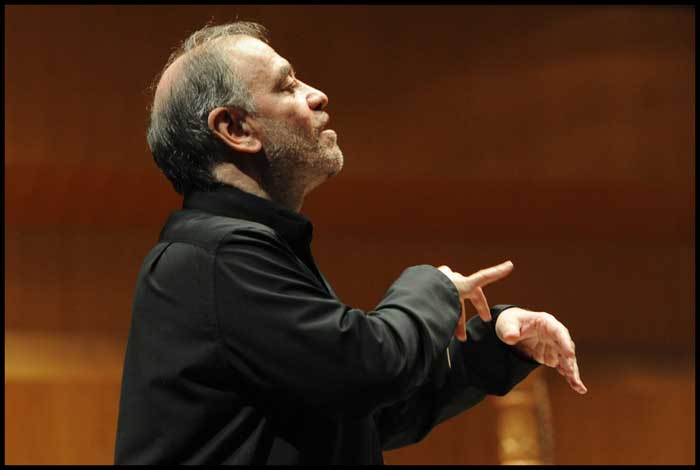Gergiev, Mariinsky open Carnegie stand with a Stravinsky night to remember

Valery Gergiev opened the Mariinsky Orchestra’s residency at Carnegie Hall with three Stravinsky ballets Thursday night.
In 2010, Valery Gergiev led the New York Philharmonic in an extensive Stravinsky festival, and conducted edge-of-your-seat performances of the great early ballets The Firebird, Petrushka and The Rite of Spring.
Thursday night, he led his own Mariinsky Orchestra in that same music, and the results were even more brilliant.
In thirty years of concert-going, this was the finest Firebird I’ve ever heard. The music began with an extraordinarily dark, rich flowing sound in the low strings, and continued as a lyrical drama. Stravinsky’s pieces, though written to accompany ballets, are constantly heard as satisfying, abstract concert music. This rendition brought together the pleasure of the architecture of notes with a powerfully moving sense of narrative. Every moment had meaning, every meaning was part of a story that concluded on the final crashing chord.
The sound of this Firebird, and the other ballets, was marvelous. Gergiev revealed Stravinsky’s orchestration in a way that seemed old-fashioned but is heard so rarely today it seemed like a radical interpretation. Great Stravinsky conductors, like Pierre Boulez and Michael Tilson Thomas, look at the music from the modernist view of the composer’s neo-Classical period, connecting later works like Agon to the ballets.
Gergiev conducted the music like it was still new, like Stravinsky was still alive and Romanticism was everywhere. That made it colorful in a special way, rich and dense, though never opaque. He blended instruments and sections, rather then setting them in relief, making complex hues instead of just primary colors, and adding touches of chiaroscuro, like painting with oils.
He did so in full partnership with the orchestra, which has been developing consistently for the last decade and now is one of the best in the world. The strings were as full and supple as always, the woodwinds are strong, and the brass, which had once been a weakness, is exceptional. The trumpets never flagged, despite the physical demands of the program, and the Petrushka solos sounded effortless. The horn section’s mellow, grainy sound was beautiful, and in combination with the strings gives the Mariinksy a truly “old world” quality that is tremendously appealing in this age of monotonous shiny orchestral brilliance.
Along with pure sound, there’s a special musicality that Gergiev and the musicians have forged. In front of the New York Philharmonic, he managed rhythms and orchestral traffic like any other conductor. His relationship with the Russian players is longer and deeper, and he cued mostly with his countenance, using his hands primarily to shape phrases in the air. He also focused attention on the accompaniment to lead-lines and solos.
There is innate trust and confidence between Gergiev and the musicians, and he gives the soloists great freedom, allowing the music to be more expressive and exciting. Even short statements like principal violist Yury Afonkin’s solo in The Firebird were deeper, and the piano part in Petrushka came off as a concerto-type solo.
Gergiev controlled the lines closely in unexpected situations, like the opening bassoon melody in The Rite of Spring. His attention to detail in this score (the 1943 revision) was greater than the other works, and the payoff was profound: even in the busiest passages, every note was clear, and the care taken on small moments like the malevolent horn rips in the “Glorification of the Chosen One” produced spine-tingling results.
Gergiev’s take on the architecture of The Rite was also unusual. Most conductors build the “Procession of the Sage” in the first tableau with crushing intensity. He held back and fit that section into a gradual and consistent ramping up of excitement in the whole tableau, and instead of taking a long pause before the opening icy chords of “The Sacrifice,” segued immediately into that section, letting the music exhale on its own. He also rendered the tricky concluding gesture of rapid upward moving line and brutal chord hit with greater cogency than I’ve heard. It was masterful musical thinking.
After a deserved ovation, Gergiev, apologizing for the length of the concert, generously offered an encore in honor of that day’s 200th birthday of Giuseppi Verdi: the overture to La forza del destino. The verve of the playing was only surpassed by the exceptional cantabile quality, it was as exciting, moving and satisfying as the ballets. One of the finest classical music concerts in New York City in many years.
Valery Gergiev leads the Mariinsky Orchestra in a Shostakovich program 8 p.m. tonight and a Rachmaninoff program 8 p.m. October 15. carnegiehall.org.






